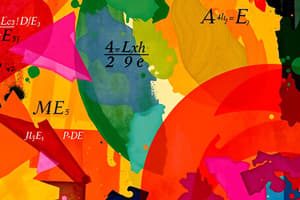Podcast
Questions and Answers
What are the two ways to classify differential equations?
What are the two ways to classify differential equations?
- By their color and size
- By their order and degree (correct)
- By their flavor and texture
- By their shape and weight
What does the general solution of a differential equation satisfy?
What does the general solution of a differential equation satisfy?
- The equation and initial/boundary conditions
- Only the equation (correct)
- Only initial/boundary conditions
- None of the above
What does the particular solution of a differential equation satisfy?
What does the particular solution of a differential equation satisfy?
- Only the equation
- Only initial/boundary conditions
- Both the equation and initial/boundary conditions (correct)
- None of the above
What are autonomous differential equations?
What are autonomous differential equations?
What are homogeneous differential equations?
What are homogeneous differential equations?
What are non-homogeneous differential equations?
What are non-homogeneous differential equations?
What is the complementary function of a non-homogeneous differential equation?
What is the complementary function of a non-homogeneous differential equation?
What is the particular integral of a non-homogeneous differential equation?
What is the particular integral of a non-homogeneous differential equation?
What is the Wronskian used for?
What is the Wronskian used for?
What is involved in series solutions of differential equations?
What is involved in series solutions of differential equations?
Flashcards
Classifying Differential Equations
Classifying Differential Equations
By their order (highest derivative) and degree (power of the highest derivative).
General Solution
General Solution
The general solution satisfies only the differential equation itself, containing arbitrary constants.
Particular Solution
Particular Solution
A particular solution satisfies both the differential equation and any initial or boundary conditions.
Autonomous Differential Equations
Autonomous Differential Equations
Signup and view all the flashcards
Homogeneous Differential Equations
Homogeneous Differential Equations
Signup and view all the flashcards
Non-Homogeneous Differential Equations
Non-Homogeneous Differential Equations
Signup and view all the flashcards
Complementary Function
Complementary Function
Signup and view all the flashcards
What is particular integral?
What is particular integral?
Signup and view all the flashcards
Wronskian
Wronskian
Signup and view all the flashcards
Series Solutions
Series Solutions
Signup and view all the flashcards
Study Notes
- Differential equations can be classified by their order and degree.
- The general solution of a differential equation satisfies the equation but may not satisfy initial/boundary conditions.
- The particular solution of a differential equation satisfies both the equation and initial/boundary conditions.
- Autonomous differential equations do not depend explicitly on the independent variable.
- Homogeneous differential equations do not have a non-zero term.
- Non-homogeneous differential equations have a non-zero term.
- The complementary function of a non-homogeneous differential equation is the general solution of the corresponding homogeneous differential equation.
- The particular integral of a non-homogeneous differential equation is the particular solution.
- The Wronskian is a determinant used to test the linear independence of functions.
- Series solutions of differential equations involve expressing the solution as a power series.
Studying That Suits You
Use AI to generate personalized quizzes and flashcards to suit your learning preferences.




